The Problem of Underage Girl Marriage in Egypt and its Implications
VerifiedAdded on 2019/09/25
|8
|3765
|170
Literature Review
AI Summary
This literature review examines the pervasive issue of early marriage in Egypt, exploring its causes, impacts, and societal implications. The review analyzes statistics, highlighting the prevalence of child marriage and its connection to poverty, lack of education, and cultural norms. It delves into the causes, including poverty, patriarchal ideologies, and the perception of girls as burdens. The study explores the impacts of early marriage on girls' health, education, and overall well-being, including increased risks of violence, health complications, and limited opportunities. It also addresses the failure of laws to protect young girls and the implications for sustainable development. The review draws on various studies and reports to provide a comprehensive understanding of the issue and its complexities.
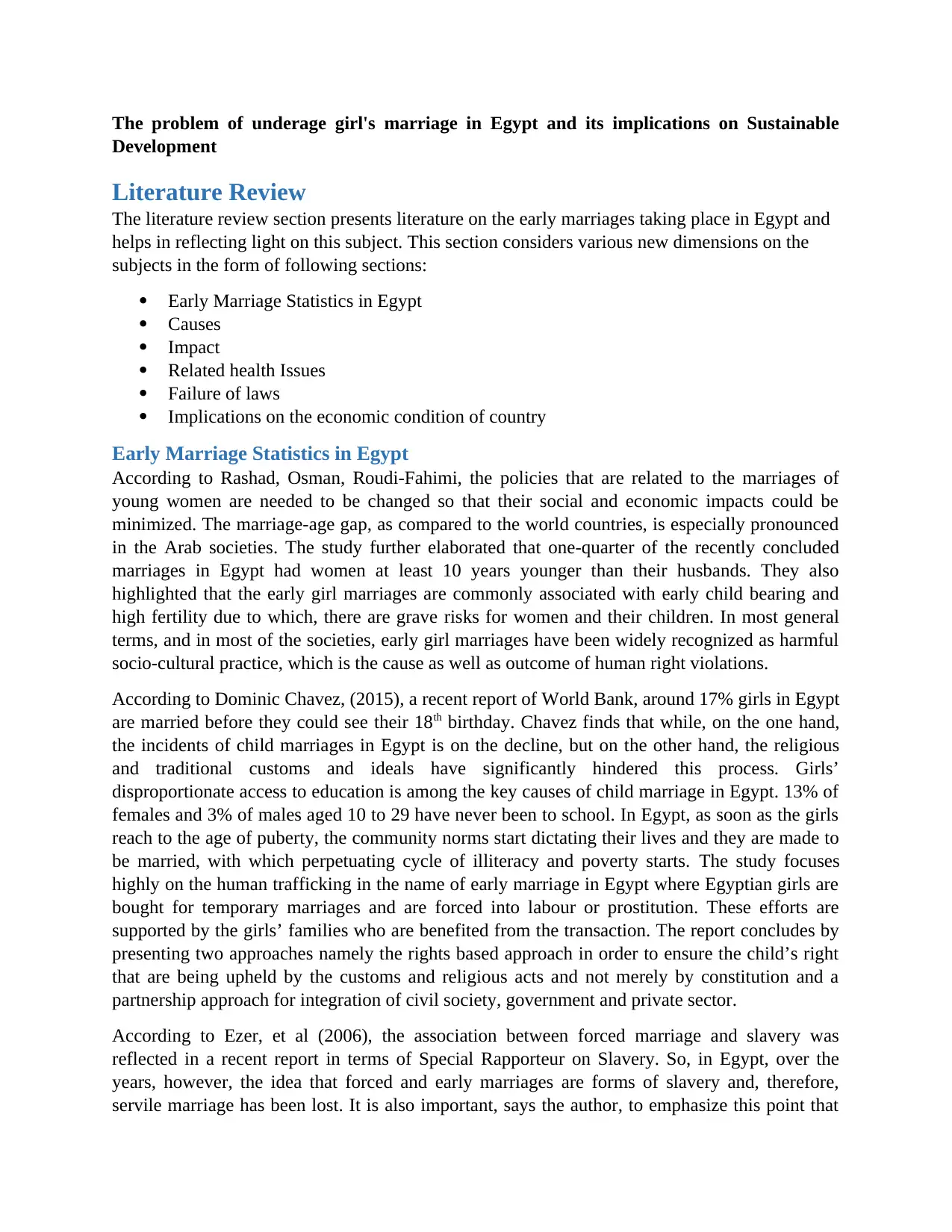
The problem of underage girl's marriage in Egypt and its implications on Sustainable
Development
Literature Review
The literature review section presents literature on the early marriages taking place in Egypt and
helps in reflecting light on this subject. This section considers various new dimensions on the
subjects in the form of following sections:
Early Marriage Statistics in Egypt
Causes
Impact
Related health Issues
Failure of laws
Implications on the economic condition of country
Early Marriage Statistics in Egypt
According to Rashad, Osman, Roudi-Fahimi, the policies that are related to the marriages of
young women are needed to be changed so that their social and economic impacts could be
minimized. The marriage-age gap, as compared to the world countries, is especially pronounced
in the Arab societies. The study further elaborated that one-quarter of the recently concluded
marriages in Egypt had women at least 10 years younger than their husbands. They also
highlighted that the early girl marriages are commonly associated with early child bearing and
high fertility due to which, there are grave risks for women and their children. In most general
terms, and in most of the societies, early girl marriages have been widely recognized as harmful
socio-cultural practice, which is the cause as well as outcome of human right violations.
According to Dominic Chavez, (2015), a recent report of World Bank, around 17% girls in Egypt
are married before they could see their 18th birthday. Chavez finds that while, on the one hand,
the incidents of child marriages in Egypt is on the decline, but on the other hand, the religious
and traditional customs and ideals have significantly hindered this process. Girls’
disproportionate access to education is among the key causes of child marriage in Egypt. 13% of
females and 3% of males aged 10 to 29 have never been to school. In Egypt, as soon as the girls
reach to the age of puberty, the community norms start dictating their lives and they are made to
be married, with which perpetuating cycle of illiteracy and poverty starts. The study focuses
highly on the human trafficking in the name of early marriage in Egypt where Egyptian girls are
bought for temporary marriages and are forced into labour or prostitution. These efforts are
supported by the girls’ families who are benefited from the transaction. The report concludes by
presenting two approaches namely the rights based approach in order to ensure the child’s right
that are being upheld by the customs and religious acts and not merely by constitution and a
partnership approach for integration of civil society, government and private sector.
According to Ezer, et al (2006), the association between forced marriage and slavery was
reflected in a recent report in terms of Special Rapporteur on Slavery. So, in Egypt, over the
years, however, the idea that forced and early marriages are forms of slavery and, therefore,
servile marriage has been lost. It is also important, says the author, to emphasize this point that
Development
Literature Review
The literature review section presents literature on the early marriages taking place in Egypt and
helps in reflecting light on this subject. This section considers various new dimensions on the
subjects in the form of following sections:
Early Marriage Statistics in Egypt
Causes
Impact
Related health Issues
Failure of laws
Implications on the economic condition of country
Early Marriage Statistics in Egypt
According to Rashad, Osman, Roudi-Fahimi, the policies that are related to the marriages of
young women are needed to be changed so that their social and economic impacts could be
minimized. The marriage-age gap, as compared to the world countries, is especially pronounced
in the Arab societies. The study further elaborated that one-quarter of the recently concluded
marriages in Egypt had women at least 10 years younger than their husbands. They also
highlighted that the early girl marriages are commonly associated with early child bearing and
high fertility due to which, there are grave risks for women and their children. In most general
terms, and in most of the societies, early girl marriages have been widely recognized as harmful
socio-cultural practice, which is the cause as well as outcome of human right violations.
According to Dominic Chavez, (2015), a recent report of World Bank, around 17% girls in Egypt
are married before they could see their 18th birthday. Chavez finds that while, on the one hand,
the incidents of child marriages in Egypt is on the decline, but on the other hand, the religious
and traditional customs and ideals have significantly hindered this process. Girls’
disproportionate access to education is among the key causes of child marriage in Egypt. 13% of
females and 3% of males aged 10 to 29 have never been to school. In Egypt, as soon as the girls
reach to the age of puberty, the community norms start dictating their lives and they are made to
be married, with which perpetuating cycle of illiteracy and poverty starts. The study focuses
highly on the human trafficking in the name of early marriage in Egypt where Egyptian girls are
bought for temporary marriages and are forced into labour or prostitution. These efforts are
supported by the girls’ families who are benefited from the transaction. The report concludes by
presenting two approaches namely the rights based approach in order to ensure the child’s right
that are being upheld by the customs and religious acts and not merely by constitution and a
partnership approach for integration of civil society, government and private sector.
According to Ezer, et al (2006), the association between forced marriage and slavery was
reflected in a recent report in terms of Special Rapporteur on Slavery. So, in Egypt, over the
years, however, the idea that forced and early marriages are forms of slavery and, therefore,
servile marriage has been lost. It is also important, says the author, to emphasize this point that
Paraphrase This Document
Need a fresh take? Get an instant paraphrase of this document with our AI Paraphraser
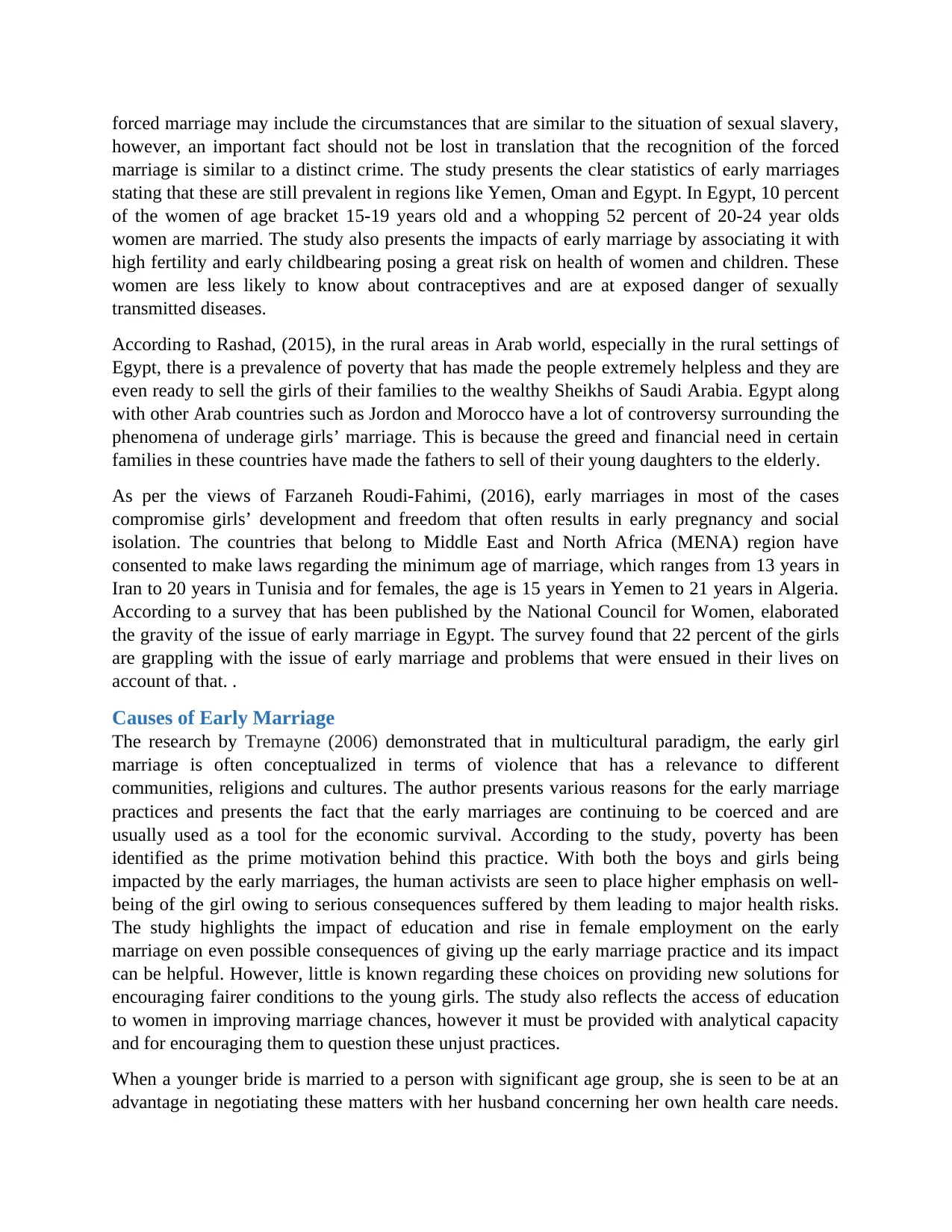
forced marriage may include the circumstances that are similar to the situation of sexual slavery,
however, an important fact should not be lost in translation that the recognition of the forced
marriage is similar to a distinct crime. The study presents the clear statistics of early marriages
stating that these are still prevalent in regions like Yemen, Oman and Egypt. In Egypt, 10 percent
of the women of age bracket 15-19 years old and a whopping 52 percent of 20-24 year olds
women are married. The study also presents the impacts of early marriage by associating it with
high fertility and early childbearing posing a great risk on health of women and children. These
women are less likely to know about contraceptives and are at exposed danger of sexually
transmitted diseases.
According to Rashad, (2015), in the rural areas in Arab world, especially in the rural settings of
Egypt, there is a prevalence of poverty that has made the people extremely helpless and they are
even ready to sell the girls of their families to the wealthy Sheikhs of Saudi Arabia. Egypt along
with other Arab countries such as Jordon and Morocco have a lot of controversy surrounding the
phenomena of underage girls’ marriage. This is because the greed and financial need in certain
families in these countries have made the fathers to sell of their young daughters to the elderly.
As per the views of Farzaneh Roudi-Fahimi, (2016), early marriages in most of the cases
compromise girls’ development and freedom that often results in early pregnancy and social
isolation. The countries that belong to Middle East and North Africa (MENA) region have
consented to make laws regarding the minimum age of marriage, which ranges from 13 years in
Iran to 20 years in Tunisia and for females, the age is 15 years in Yemen to 21 years in Algeria.
According to a survey that has been published by the National Council for Women, elaborated
the gravity of the issue of early marriage in Egypt. The survey found that 22 percent of the girls
are grappling with the issue of early marriage and problems that were ensued in their lives on
account of that. .
Causes of Early Marriage
The research by Tremayne (2006) demonstrated that in multicultural paradigm, the early girl
marriage is often conceptualized in terms of violence that has a relevance to different
communities, religions and cultures. The author presents various reasons for the early marriage
practices and presents the fact that the early marriages are continuing to be coerced and are
usually used as a tool for the economic survival. According to the study, poverty has been
identified as the prime motivation behind this practice. With both the boys and girls being
impacted by the early marriages, the human activists are seen to place higher emphasis on well-
being of the girl owing to serious consequences suffered by them leading to major health risks.
The study highlights the impact of education and rise in female employment on the early
marriage on even possible consequences of giving up the early marriage practice and its impact
can be helpful. However, little is known regarding these choices on providing new solutions for
encouraging fairer conditions to the young girls. The study also reflects the access of education
to women in improving marriage chances, however it must be provided with analytical capacity
and for encouraging them to question these unjust practices.
When a younger bride is married to a person with significant age group, she is seen to be at an
advantage in negotiating these matters with her husband concerning her own health care needs.
however, an important fact should not be lost in translation that the recognition of the forced
marriage is similar to a distinct crime. The study presents the clear statistics of early marriages
stating that these are still prevalent in regions like Yemen, Oman and Egypt. In Egypt, 10 percent
of the women of age bracket 15-19 years old and a whopping 52 percent of 20-24 year olds
women are married. The study also presents the impacts of early marriage by associating it with
high fertility and early childbearing posing a great risk on health of women and children. These
women are less likely to know about contraceptives and are at exposed danger of sexually
transmitted diseases.
According to Rashad, (2015), in the rural areas in Arab world, especially in the rural settings of
Egypt, there is a prevalence of poverty that has made the people extremely helpless and they are
even ready to sell the girls of their families to the wealthy Sheikhs of Saudi Arabia. Egypt along
with other Arab countries such as Jordon and Morocco have a lot of controversy surrounding the
phenomena of underage girls’ marriage. This is because the greed and financial need in certain
families in these countries have made the fathers to sell of their young daughters to the elderly.
As per the views of Farzaneh Roudi-Fahimi, (2016), early marriages in most of the cases
compromise girls’ development and freedom that often results in early pregnancy and social
isolation. The countries that belong to Middle East and North Africa (MENA) region have
consented to make laws regarding the minimum age of marriage, which ranges from 13 years in
Iran to 20 years in Tunisia and for females, the age is 15 years in Yemen to 21 years in Algeria.
According to a survey that has been published by the National Council for Women, elaborated
the gravity of the issue of early marriage in Egypt. The survey found that 22 percent of the girls
are grappling with the issue of early marriage and problems that were ensued in their lives on
account of that. .
Causes of Early Marriage
The research by Tremayne (2006) demonstrated that in multicultural paradigm, the early girl
marriage is often conceptualized in terms of violence that has a relevance to different
communities, religions and cultures. The author presents various reasons for the early marriage
practices and presents the fact that the early marriages are continuing to be coerced and are
usually used as a tool for the economic survival. According to the study, poverty has been
identified as the prime motivation behind this practice. With both the boys and girls being
impacted by the early marriages, the human activists are seen to place higher emphasis on well-
being of the girl owing to serious consequences suffered by them leading to major health risks.
The study highlights the impact of education and rise in female employment on the early
marriage on even possible consequences of giving up the early marriage practice and its impact
can be helpful. However, little is known regarding these choices on providing new solutions for
encouraging fairer conditions to the young girls. The study also reflects the access of education
to women in improving marriage chances, however it must be provided with analytical capacity
and for encouraging them to question these unjust practices.
When a younger bride is married to a person with significant age group, she is seen to be at an
advantage in negotiating these matters with her husband concerning her own health care needs.
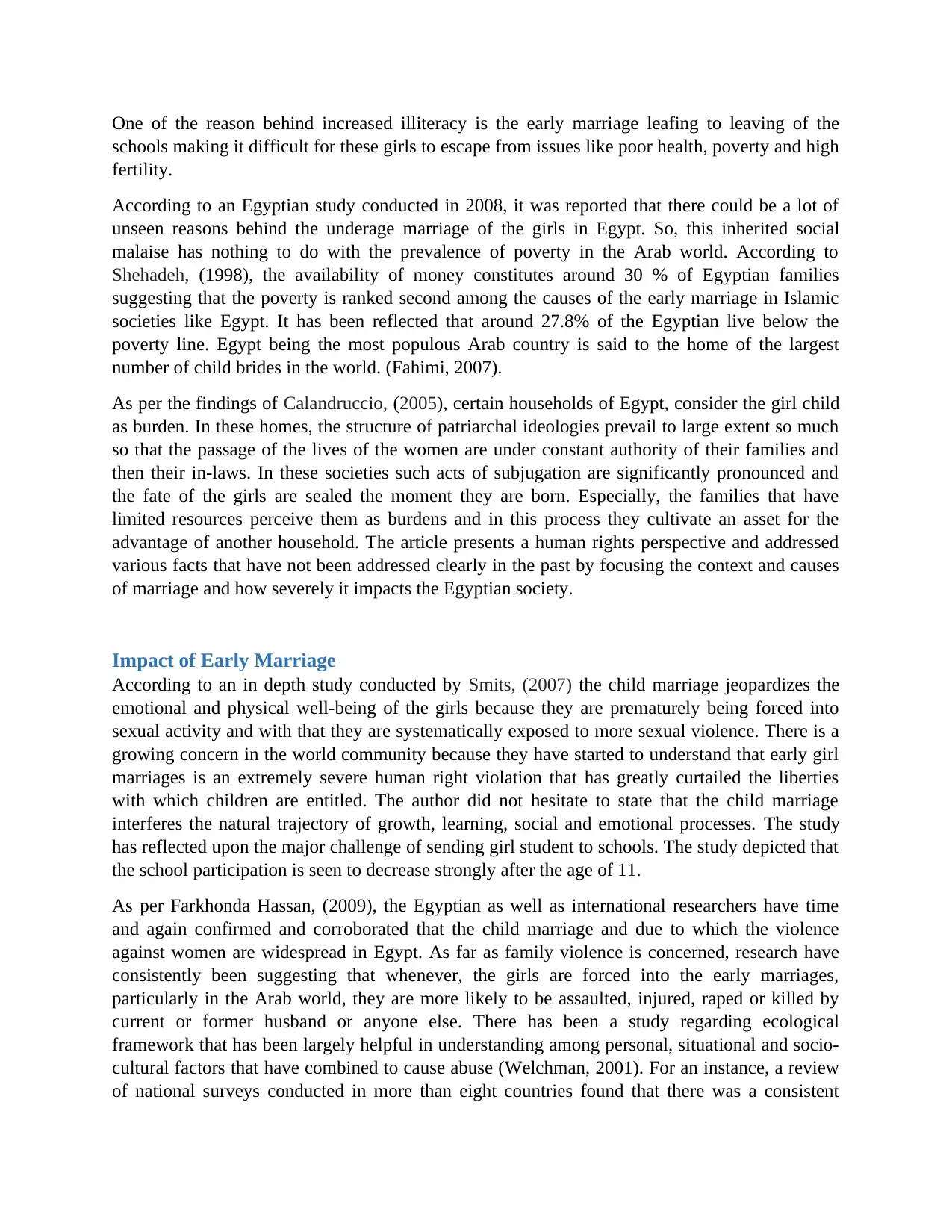
One of the reason behind increased illiteracy is the early marriage leafing to leaving of the
schools making it difficult for these girls to escape from issues like poor health, poverty and high
fertility.
According to an Egyptian study conducted in 2008, it was reported that there could be a lot of
unseen reasons behind the underage marriage of the girls in Egypt. So, this inherited social
malaise has nothing to do with the prevalence of poverty in the Arab world. According to
Shehadeh, (1998), the availability of money constitutes around 30 % of Egyptian families
suggesting that the poverty is ranked second among the causes of the early marriage in Islamic
societies like Egypt. It has been reflected that around 27.8% of the Egyptian live below the
poverty line. Egypt being the most populous Arab country is said to the home of the largest
number of child brides in the world. (Fahimi, 2007).
As per the findings of Calandruccio, (2005), certain households of Egypt, consider the girl child
as burden. In these homes, the structure of patriarchal ideologies prevail to large extent so much
so that the passage of the lives of the women are under constant authority of their families and
then their in-laws. In these societies such acts of subjugation are significantly pronounced and
the fate of the girls are sealed the moment they are born. Especially, the families that have
limited resources perceive them as burdens and in this process they cultivate an asset for the
advantage of another household. The article presents a human rights perspective and addressed
various facts that have not been addressed clearly in the past by focusing the context and causes
of marriage and how severely it impacts the Egyptian society.
Impact of Early Marriage
According to an in depth study conducted by Smits, (2007) the child marriage jeopardizes the
emotional and physical well-being of the girls because they are prematurely being forced into
sexual activity and with that they are systematically exposed to more sexual violence. There is a
growing concern in the world community because they have started to understand that early girl
marriages is an extremely severe human right violation that has greatly curtailed the liberties
with which children are entitled. The author did not hesitate to state that the child marriage
interferes the natural trajectory of growth, learning, social and emotional processes. The study
has reflected upon the major challenge of sending girl student to schools. The study depicted that
the school participation is seen to decrease strongly after the age of 11.
As per Farkhonda Hassan, (2009), the Egyptian as well as international researchers have time
and again confirmed and corroborated that the child marriage and due to which the violence
against women are widespread in Egypt. As far as family violence is concerned, research have
consistently been suggesting that whenever, the girls are forced into the early marriages,
particularly in the Arab world, they are more likely to be assaulted, injured, raped or killed by
current or former husband or anyone else. There has been a study regarding ecological
framework that has been largely helpful in understanding among personal, situational and socio-
cultural factors that have combined to cause abuse (Welchman, 2001). For an instance, a review
of national surveys conducted in more than eight countries found that there was a consistent
schools making it difficult for these girls to escape from issues like poor health, poverty and high
fertility.
According to an Egyptian study conducted in 2008, it was reported that there could be a lot of
unseen reasons behind the underage marriage of the girls in Egypt. So, this inherited social
malaise has nothing to do with the prevalence of poverty in the Arab world. According to
Shehadeh, (1998), the availability of money constitutes around 30 % of Egyptian families
suggesting that the poverty is ranked second among the causes of the early marriage in Islamic
societies like Egypt. It has been reflected that around 27.8% of the Egyptian live below the
poverty line. Egypt being the most populous Arab country is said to the home of the largest
number of child brides in the world. (Fahimi, 2007).
As per the findings of Calandruccio, (2005), certain households of Egypt, consider the girl child
as burden. In these homes, the structure of patriarchal ideologies prevail to large extent so much
so that the passage of the lives of the women are under constant authority of their families and
then their in-laws. In these societies such acts of subjugation are significantly pronounced and
the fate of the girls are sealed the moment they are born. Especially, the families that have
limited resources perceive them as burdens and in this process they cultivate an asset for the
advantage of another household. The article presents a human rights perspective and addressed
various facts that have not been addressed clearly in the past by focusing the context and causes
of marriage and how severely it impacts the Egyptian society.
Impact of Early Marriage
According to an in depth study conducted by Smits, (2007) the child marriage jeopardizes the
emotional and physical well-being of the girls because they are prematurely being forced into
sexual activity and with that they are systematically exposed to more sexual violence. There is a
growing concern in the world community because they have started to understand that early girl
marriages is an extremely severe human right violation that has greatly curtailed the liberties
with which children are entitled. The author did not hesitate to state that the child marriage
interferes the natural trajectory of growth, learning, social and emotional processes. The study
has reflected upon the major challenge of sending girl student to schools. The study depicted that
the school participation is seen to decrease strongly after the age of 11.
As per Farkhonda Hassan, (2009), the Egyptian as well as international researchers have time
and again confirmed and corroborated that the child marriage and due to which the violence
against women are widespread in Egypt. As far as family violence is concerned, research have
consistently been suggesting that whenever, the girls are forced into the early marriages,
particularly in the Arab world, they are more likely to be assaulted, injured, raped or killed by
current or former husband or anyone else. There has been a study regarding ecological
framework that has been largely helpful in understanding among personal, situational and socio-
cultural factors that have combined to cause abuse (Welchman, 2001). For an instance, a review
of national surveys conducted in more than eight countries found that there was a consistent
⊘ This is a preview!⊘
Do you want full access?
Subscribe today to unlock all pages.

Trusted by 1+ million students worldwide
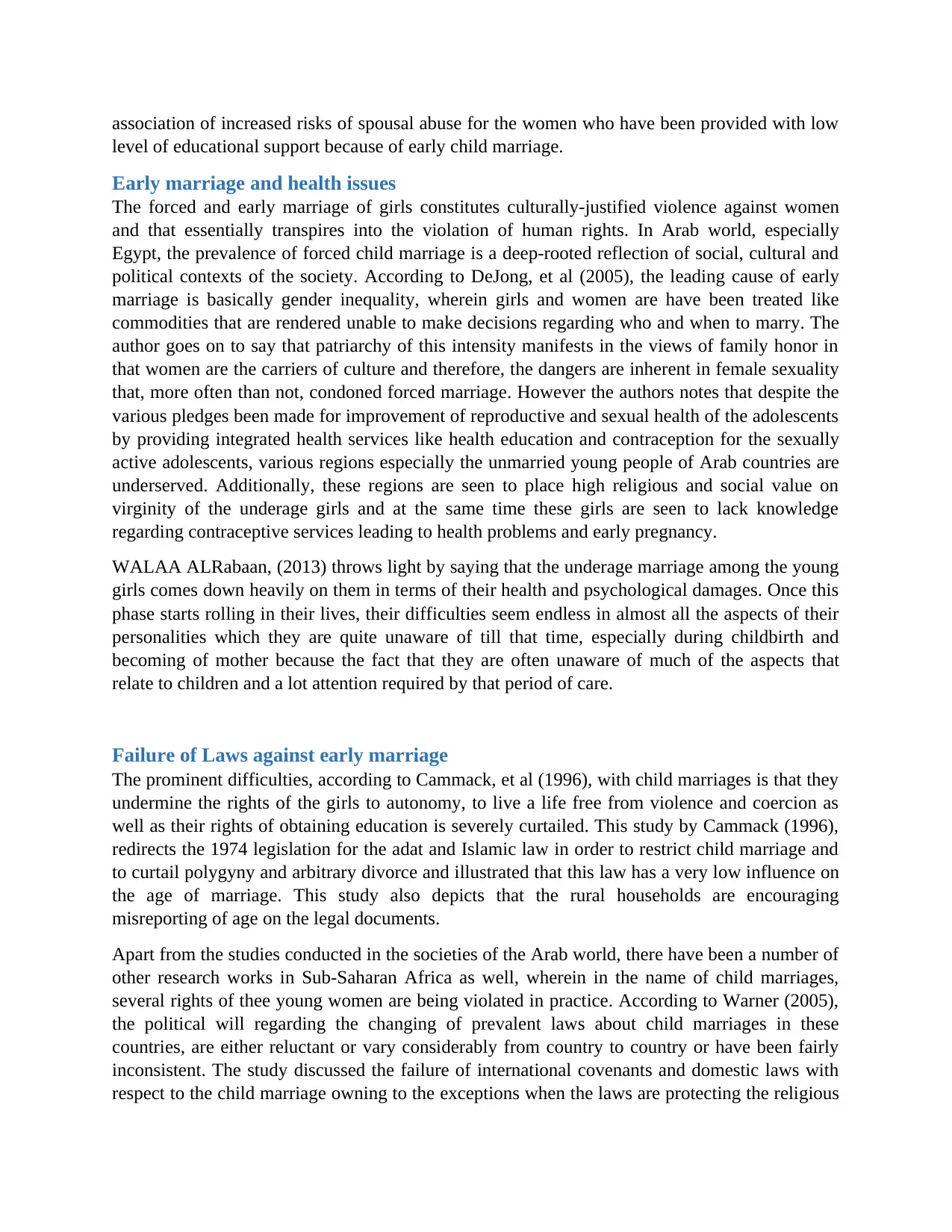
association of increased risks of spousal abuse for the women who have been provided with low
level of educational support because of early child marriage.
Early marriage and health issues
The forced and early marriage of girls constitutes culturally-justified violence against women
and that essentially transpires into the violation of human rights. In Arab world, especially
Egypt, the prevalence of forced child marriage is a deep-rooted reflection of social, cultural and
political contexts of the society. According to DeJong, et al (2005), the leading cause of early
marriage is basically gender inequality, wherein girls and women are have been treated like
commodities that are rendered unable to make decisions regarding who and when to marry. The
author goes on to say that patriarchy of this intensity manifests in the views of family honor in
that women are the carriers of culture and therefore, the dangers are inherent in female sexuality
that, more often than not, condoned forced marriage. However the authors notes that despite the
various pledges been made for improvement of reproductive and sexual health of the adolescents
by providing integrated health services like health education and contraception for the sexually
active adolescents, various regions especially the unmarried young people of Arab countries are
underserved. Additionally, these regions are seen to place high religious and social value on
virginity of the underage girls and at the same time these girls are seen to lack knowledge
regarding contraceptive services leading to health problems and early pregnancy.
WALAA ALRabaan, (2013) throws light by saying that the underage marriage among the young
girls comes down heavily on them in terms of their health and psychological damages. Once this
phase starts rolling in their lives, their difficulties seem endless in almost all the aspects of their
personalities which they are quite unaware of till that time, especially during childbirth and
becoming of mother because the fact that they are often unaware of much of the aspects that
relate to children and a lot attention required by that period of care.
Failure of Laws against early marriage
The prominent difficulties, according to Cammack, et al (1996), with child marriages is that they
undermine the rights of the girls to autonomy, to live a life free from violence and coercion as
well as their rights of obtaining education is severely curtailed. This study by Cammack (1996),
redirects the 1974 legislation for the adat and Islamic law in order to restrict child marriage and
to curtail polygyny and arbitrary divorce and illustrated that this law has a very low influence on
the age of marriage. This study also depicts that the rural households are encouraging
misreporting of age on the legal documents.
Apart from the studies conducted in the societies of the Arab world, there have been a number of
other research works in Sub-Saharan Africa as well, wherein in the name of child marriages,
several rights of thee young women are being violated in practice. According to Warner (2005),
the political will regarding the changing of prevalent laws about child marriages in these
countries, are either reluctant or vary considerably from country to country or have been fairly
inconsistent. The study discussed the failure of international covenants and domestic laws with
respect to the child marriage owning to the exceptions when the laws are protecting the religious
level of educational support because of early child marriage.
Early marriage and health issues
The forced and early marriage of girls constitutes culturally-justified violence against women
and that essentially transpires into the violation of human rights. In Arab world, especially
Egypt, the prevalence of forced child marriage is a deep-rooted reflection of social, cultural and
political contexts of the society. According to DeJong, et al (2005), the leading cause of early
marriage is basically gender inequality, wherein girls and women are have been treated like
commodities that are rendered unable to make decisions regarding who and when to marry. The
author goes on to say that patriarchy of this intensity manifests in the views of family honor in
that women are the carriers of culture and therefore, the dangers are inherent in female sexuality
that, more often than not, condoned forced marriage. However the authors notes that despite the
various pledges been made for improvement of reproductive and sexual health of the adolescents
by providing integrated health services like health education and contraception for the sexually
active adolescents, various regions especially the unmarried young people of Arab countries are
underserved. Additionally, these regions are seen to place high religious and social value on
virginity of the underage girls and at the same time these girls are seen to lack knowledge
regarding contraceptive services leading to health problems and early pregnancy.
WALAA ALRabaan, (2013) throws light by saying that the underage marriage among the young
girls comes down heavily on them in terms of their health and psychological damages. Once this
phase starts rolling in their lives, their difficulties seem endless in almost all the aspects of their
personalities which they are quite unaware of till that time, especially during childbirth and
becoming of mother because the fact that they are often unaware of much of the aspects that
relate to children and a lot attention required by that period of care.
Failure of Laws against early marriage
The prominent difficulties, according to Cammack, et al (1996), with child marriages is that they
undermine the rights of the girls to autonomy, to live a life free from violence and coercion as
well as their rights of obtaining education is severely curtailed. This study by Cammack (1996),
redirects the 1974 legislation for the adat and Islamic law in order to restrict child marriage and
to curtail polygyny and arbitrary divorce and illustrated that this law has a very low influence on
the age of marriage. This study also depicts that the rural households are encouraging
misreporting of age on the legal documents.
Apart from the studies conducted in the societies of the Arab world, there have been a number of
other research works in Sub-Saharan Africa as well, wherein in the name of child marriages,
several rights of thee young women are being violated in practice. According to Warner (2005),
the political will regarding the changing of prevalent laws about child marriages in these
countries, are either reluctant or vary considerably from country to country or have been fairly
inconsistent. The study discussed the failure of international covenants and domestic laws with
respect to the child marriage owning to the exceptions when the laws are protecting the religious
Paraphrase This Document
Need a fresh take? Get an instant paraphrase of this document with our AI Paraphraser
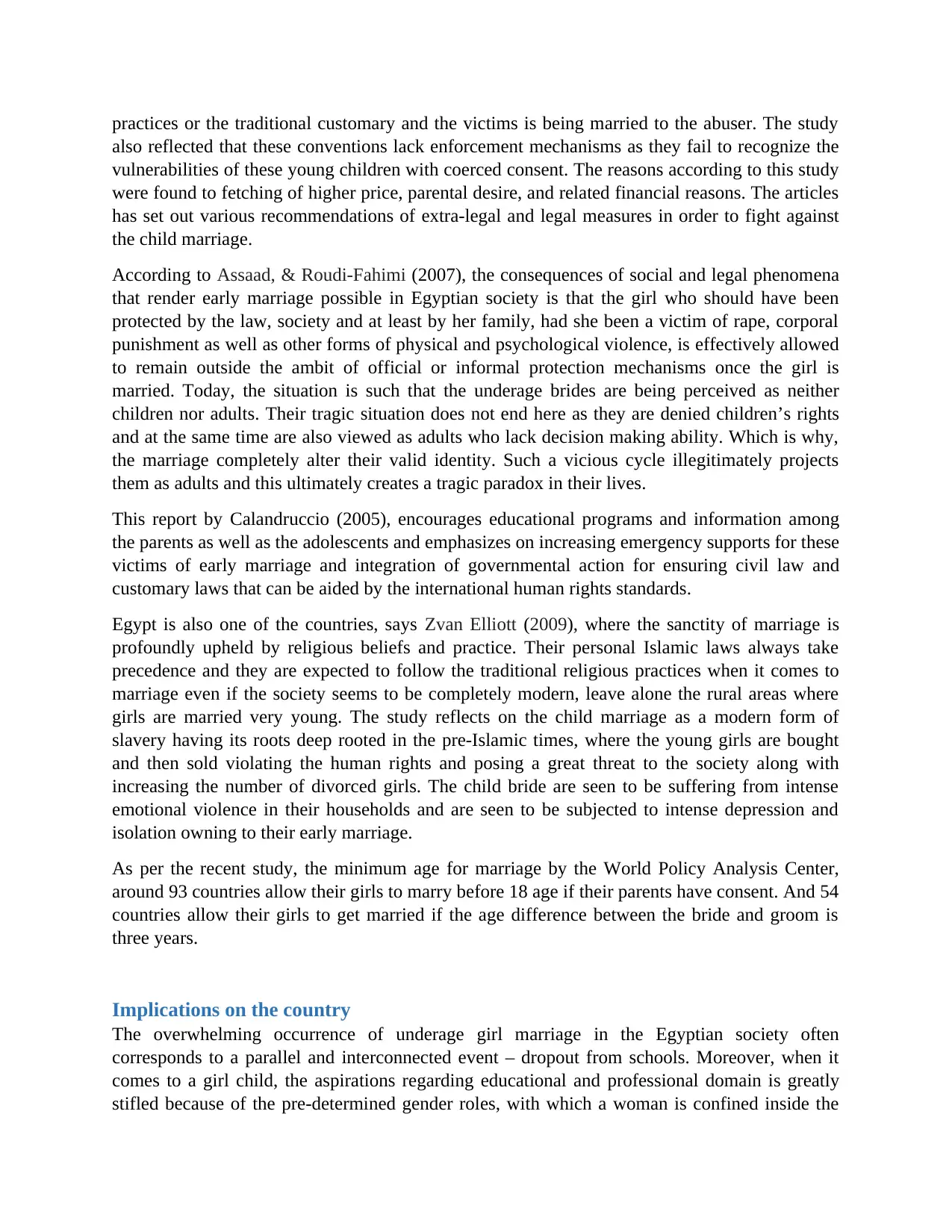
practices or the traditional customary and the victims is being married to the abuser. The study
also reflected that these conventions lack enforcement mechanisms as they fail to recognize the
vulnerabilities of these young children with coerced consent. The reasons according to this study
were found to fetching of higher price, parental desire, and related financial reasons. The articles
has set out various recommendations of extra-legal and legal measures in order to fight against
the child marriage.
According to Assaad, & Roudi-Fahimi (2007), the consequences of social and legal phenomena
that render early marriage possible in Egyptian society is that the girl who should have been
protected by the law, society and at least by her family, had she been a victim of rape, corporal
punishment as well as other forms of physical and psychological violence, is effectively allowed
to remain outside the ambit of official or informal protection mechanisms once the girl is
married. Today, the situation is such that the underage brides are being perceived as neither
children nor adults. Their tragic situation does not end here as they are denied children’s rights
and at the same time are also viewed as adults who lack decision making ability. Which is why,
the marriage completely alter their valid identity. Such a vicious cycle illegitimately projects
them as adults and this ultimately creates a tragic paradox in their lives.
This report by Calandruccio (2005), encourages educational programs and information among
the parents as well as the adolescents and emphasizes on increasing emergency supports for these
victims of early marriage and integration of governmental action for ensuring civil law and
customary laws that can be aided by the international human rights standards.
Egypt is also one of the countries, says Zvan Elliott (2009), where the sanctity of marriage is
profoundly upheld by religious beliefs and practice. Their personal Islamic laws always take
precedence and they are expected to follow the traditional religious practices when it comes to
marriage even if the society seems to be completely modern, leave alone the rural areas where
girls are married very young. The study reflects on the child marriage as a modern form of
slavery having its roots deep rooted in the pre-Islamic times, where the young girls are bought
and then sold violating the human rights and posing a great threat to the society along with
increasing the number of divorced girls. The child bride are seen to be suffering from intense
emotional violence in their households and are seen to be subjected to intense depression and
isolation owning to their early marriage.
As per the recent study, the minimum age for marriage by the World Policy Analysis Center,
around 93 countries allow their girls to marry before 18 age if their parents have consent. And 54
countries allow their girls to get married if the age difference between the bride and groom is
three years.
Implications on the country
The overwhelming occurrence of underage girl marriage in the Egyptian society often
corresponds to a parallel and interconnected event – dropout from schools. Moreover, when it
comes to a girl child, the aspirations regarding educational and professional domain is greatly
stifled because of the pre-determined gender roles, with which a woman is confined inside the
also reflected that these conventions lack enforcement mechanisms as they fail to recognize the
vulnerabilities of these young children with coerced consent. The reasons according to this study
were found to fetching of higher price, parental desire, and related financial reasons. The articles
has set out various recommendations of extra-legal and legal measures in order to fight against
the child marriage.
According to Assaad, & Roudi-Fahimi (2007), the consequences of social and legal phenomena
that render early marriage possible in Egyptian society is that the girl who should have been
protected by the law, society and at least by her family, had she been a victim of rape, corporal
punishment as well as other forms of physical and psychological violence, is effectively allowed
to remain outside the ambit of official or informal protection mechanisms once the girl is
married. Today, the situation is such that the underage brides are being perceived as neither
children nor adults. Their tragic situation does not end here as they are denied children’s rights
and at the same time are also viewed as adults who lack decision making ability. Which is why,
the marriage completely alter their valid identity. Such a vicious cycle illegitimately projects
them as adults and this ultimately creates a tragic paradox in their lives.
This report by Calandruccio (2005), encourages educational programs and information among
the parents as well as the adolescents and emphasizes on increasing emergency supports for these
victims of early marriage and integration of governmental action for ensuring civil law and
customary laws that can be aided by the international human rights standards.
Egypt is also one of the countries, says Zvan Elliott (2009), where the sanctity of marriage is
profoundly upheld by religious beliefs and practice. Their personal Islamic laws always take
precedence and they are expected to follow the traditional religious practices when it comes to
marriage even if the society seems to be completely modern, leave alone the rural areas where
girls are married very young. The study reflects on the child marriage as a modern form of
slavery having its roots deep rooted in the pre-Islamic times, where the young girls are bought
and then sold violating the human rights and posing a great threat to the society along with
increasing the number of divorced girls. The child bride are seen to be suffering from intense
emotional violence in their households and are seen to be subjected to intense depression and
isolation owning to their early marriage.
As per the recent study, the minimum age for marriage by the World Policy Analysis Center,
around 93 countries allow their girls to marry before 18 age if their parents have consent. And 54
countries allow their girls to get married if the age difference between the bride and groom is
three years.
Implications on the country
The overwhelming occurrence of underage girl marriage in the Egyptian society often
corresponds to a parallel and interconnected event – dropout from schools. Moreover, when it
comes to a girl child, the aspirations regarding educational and professional domain is greatly
stifled because of the pre-determined gender roles, with which a woman is confined inside the
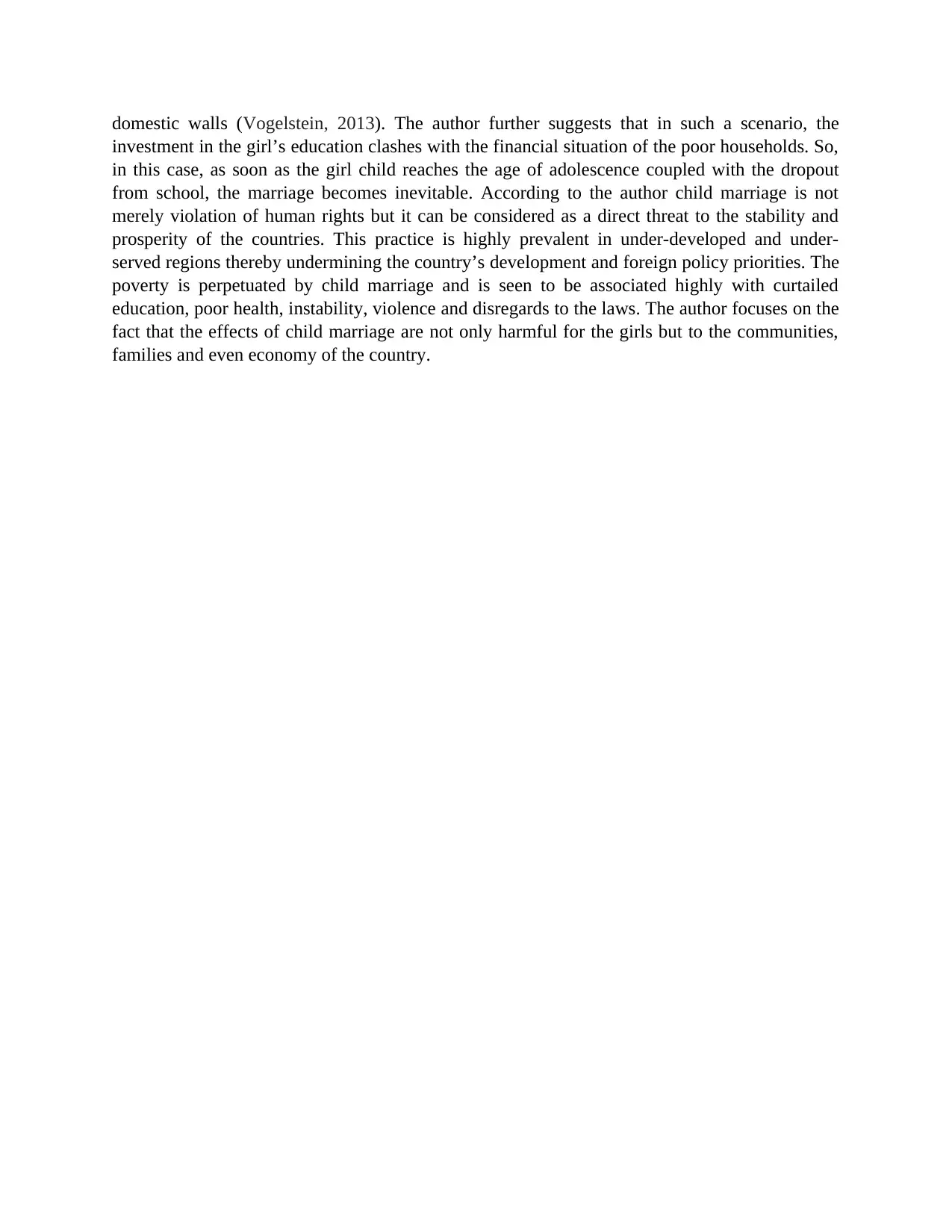
domestic walls (Vogelstein, 2013). The author further suggests that in such a scenario, the
investment in the girl’s education clashes with the financial situation of the poor households. So,
in this case, as soon as the girl child reaches the age of adolescence coupled with the dropout
from school, the marriage becomes inevitable. According to the author child marriage is not
merely violation of human rights but it can be considered as a direct threat to the stability and
prosperity of the countries. This practice is highly prevalent in under-developed and under-
served regions thereby undermining the country’s development and foreign policy priorities. The
poverty is perpetuated by child marriage and is seen to be associated highly with curtailed
education, poor health, instability, violence and disregards to the laws. The author focuses on the
fact that the effects of child marriage are not only harmful for the girls but to the communities,
families and even economy of the country.
investment in the girl’s education clashes with the financial situation of the poor households. So,
in this case, as soon as the girl child reaches the age of adolescence coupled with the dropout
from school, the marriage becomes inevitable. According to the author child marriage is not
merely violation of human rights but it can be considered as a direct threat to the stability and
prosperity of the countries. This practice is highly prevalent in under-developed and under-
served regions thereby undermining the country’s development and foreign policy priorities. The
poverty is perpetuated by child marriage and is seen to be associated highly with curtailed
education, poor health, instability, violence and disregards to the laws. The author focuses on the
fact that the effects of child marriage are not only harmful for the girls but to the communities,
families and even economy of the country.
⊘ This is a preview!⊘
Do you want full access?
Subscribe today to unlock all pages.

Trusted by 1+ million students worldwide
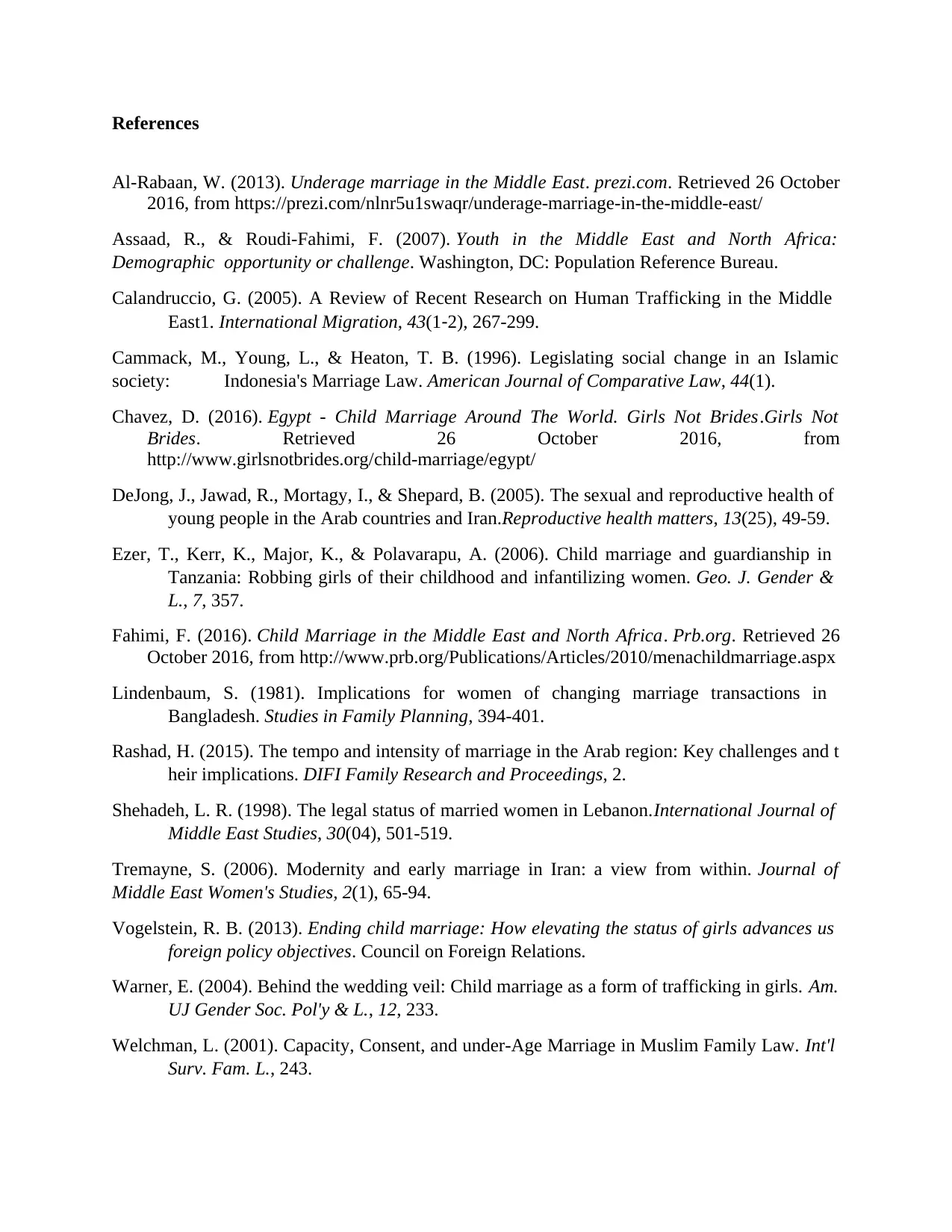
References
Al-Rabaan, W. (2013). Underage marriage in the Middle East. prezi.com. Retrieved 26 October
2016, from https://prezi.com/nlnr5u1swaqr/underage-marriage-in-the-middle-east/
Assaad, R., & Roudi-Fahimi, F. (2007). Youth in the Middle East and North Africa:
Demographic opportunity or challenge. Washington, DC: Population Reference Bureau.
Calandruccio, G. (2005). A Review of Recent Research on Human Trafficking in the Middle
East1. International Migration, 43(1‐2), 267-299.
Cammack, M., Young, L., & Heaton, T. B. (1996). Legislating social change in an Islamic
society: Indonesia's Marriage Law. American Journal of Comparative Law, 44(1).
Chavez, D. (2016). Egypt - Child Marriage Around The World. Girls Not Brides.Girls Not
Brides. Retrieved 26 October 2016, from
http://www.girlsnotbrides.org/child-marriage/egypt/
DeJong, J., Jawad, R., Mortagy, I., & Shepard, B. (2005). The sexual and reproductive health of
young people in the Arab countries and Iran.Reproductive health matters, 13(25), 49-59.
Ezer, T., Kerr, K., Major, K., & Polavarapu, A. (2006). Child marriage and guardianship in
Tanzania: Robbing girls of their childhood and infantilizing women. Geo. J. Gender &
L., 7, 357.
Fahimi, F. (2016). Child Marriage in the Middle East and North Africa. Prb.org. Retrieved 26
October 2016, from http://www.prb.org/Publications/Articles/2010/menachildmarriage.aspx
Lindenbaum, S. (1981). Implications for women of changing marriage transactions in
Bangladesh. Studies in Family Planning, 394-401.
Rashad, H. (2015). The tempo and intensity of marriage in the Arab region: Key challenges and t
heir implications. DIFI Family Research and Proceedings, 2.
Shehadeh, L. R. (1998). The legal status of married women in Lebanon.International Journal of
Middle East Studies, 30(04), 501-519.
Tremayne, S. (2006). Modernity and early marriage in Iran: a view from within. Journal of
Middle East Women's Studies, 2(1), 65-94.
Vogelstein, R. B. (2013). Ending child marriage: How elevating the status of girls advances us
foreign policy objectives. Council on Foreign Relations.
Warner, E. (2004). Behind the wedding veil: Child marriage as a form of trafficking in girls. Am.
UJ Gender Soc. Pol'y & L., 12, 233.
Welchman, L. (2001). Capacity, Consent, and under-Age Marriage in Muslim Family Law. Int'l
Surv. Fam. L., 243.
Al-Rabaan, W. (2013). Underage marriage in the Middle East. prezi.com. Retrieved 26 October
2016, from https://prezi.com/nlnr5u1swaqr/underage-marriage-in-the-middle-east/
Assaad, R., & Roudi-Fahimi, F. (2007). Youth in the Middle East and North Africa:
Demographic opportunity or challenge. Washington, DC: Population Reference Bureau.
Calandruccio, G. (2005). A Review of Recent Research on Human Trafficking in the Middle
East1. International Migration, 43(1‐2), 267-299.
Cammack, M., Young, L., & Heaton, T. B. (1996). Legislating social change in an Islamic
society: Indonesia's Marriage Law. American Journal of Comparative Law, 44(1).
Chavez, D. (2016). Egypt - Child Marriage Around The World. Girls Not Brides.Girls Not
Brides. Retrieved 26 October 2016, from
http://www.girlsnotbrides.org/child-marriage/egypt/
DeJong, J., Jawad, R., Mortagy, I., & Shepard, B. (2005). The sexual and reproductive health of
young people in the Arab countries and Iran.Reproductive health matters, 13(25), 49-59.
Ezer, T., Kerr, K., Major, K., & Polavarapu, A. (2006). Child marriage and guardianship in
Tanzania: Robbing girls of their childhood and infantilizing women. Geo. J. Gender &
L., 7, 357.
Fahimi, F. (2016). Child Marriage in the Middle East and North Africa. Prb.org. Retrieved 26
October 2016, from http://www.prb.org/Publications/Articles/2010/menachildmarriage.aspx
Lindenbaum, S. (1981). Implications for women of changing marriage transactions in
Bangladesh. Studies in Family Planning, 394-401.
Rashad, H. (2015). The tempo and intensity of marriage in the Arab region: Key challenges and t
heir implications. DIFI Family Research and Proceedings, 2.
Shehadeh, L. R. (1998). The legal status of married women in Lebanon.International Journal of
Middle East Studies, 30(04), 501-519.
Tremayne, S. (2006). Modernity and early marriage in Iran: a view from within. Journal of
Middle East Women's Studies, 2(1), 65-94.
Vogelstein, R. B. (2013). Ending child marriage: How elevating the status of girls advances us
foreign policy objectives. Council on Foreign Relations.
Warner, E. (2004). Behind the wedding veil: Child marriage as a form of trafficking in girls. Am.
UJ Gender Soc. Pol'y & L., 12, 233.
Welchman, L. (2001). Capacity, Consent, and under-Age Marriage in Muslim Family Law. Int'l
Surv. Fam. L., 243.
Paraphrase This Document
Need a fresh take? Get an instant paraphrase of this document with our AI Paraphraser

Zvan Elliott, K. (2009). Reforming the Moroccan Personal Status Code: A Revolution for
Whom?. Mediterranean Politics, 14(2), 213-227.
Smits, J. (2007). Family background and context effects on educational participation in five
Arab countries. Nijmegen Center for Economics (NiCE), working paper, 07-106.
Rashad, O. Roudi-Fahimi. Marriage in the Arab World.
Whom?. Mediterranean Politics, 14(2), 213-227.
Smits, J. (2007). Family background and context effects on educational participation in five
Arab countries. Nijmegen Center for Economics (NiCE), working paper, 07-106.
Rashad, O. Roudi-Fahimi. Marriage in the Arab World.
1 out of 8
Related Documents
Your All-in-One AI-Powered Toolkit for Academic Success.
+13062052269
info@desklib.com
Available 24*7 on WhatsApp / Email
![[object Object]](/_next/static/media/star-bottom.7253800d.svg)
Unlock your academic potential
Copyright © 2020–2026 A2Z Services. All Rights Reserved. Developed and managed by ZUCOL.



